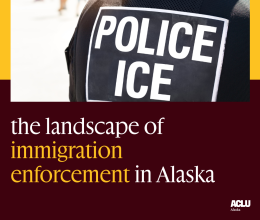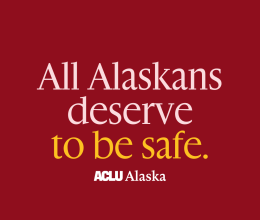
Across the country, communities are seeing the dehumanizing and violent impacts of President Trump’s deportation regime. While immigration enforcement looks different in Alaska compared to the Lower 48, targeted immigration enforcement by Immigration and Customs Enforcement (ICE) has had jarring impacts on non-citizen Alaskans who are detained, as well as family members, neighbors, and strangers who witness these arrests.
Knowing your rights and responsibilities to protect yourself and your community is the best way you can fight back against the mass deportation efforts by the federal government.
The following information is intended to help you support someone who is being arrested if you see an enforcement action take place.
Do not try to physically stop the enforcement action
Do not attempt to physically interfere with ICE officers; it’s highly unlikely that you can prevent an arrest from happening. Attempting to interfere could endanger the people you are trying to help or yourself.
According to an analysis of federal court filings, there has been a 25% increase in assault charges against federal officers in the first nine months of 2025, compared to 2024. Interfering in an enforcement action could lead to criminal charges for you, leaving the person being detained without an advocate.
Gather as much information as you can
Asking the person being detained for the following information can help alert their family or attorney of their arrest. Ask them and write down the following questions.
- “What is your name, date of birth, and country of origin?”
- “What is your Alien Registration Number (A Number)?”
- “Do you have someone I can contact for you?”
- “Do you have belongings you’d like me to take?”
Always respect the wishes of the person being detained. They may not wish to share this information with you.
Document the arrest
Alaska is a one-party consent state, meaning you do not have to have another person’s consent to film or record their actions. The First Amendment protects the right to record police performing their duties in public as long as you are not interfering. Document the names of the officers, their badge numbers, and the agencies they work for.
Narrate the date, time, and location of the arrest and what is occurring. Write down or record what you are witnessing. Stay calm and courteous, and a safe distance away.
Make sure to consider the arrestee’s privacy rights when sharing a video. Consider blurring out the person’s face or cutting sections of the recording that contain personal information of the individual.
Help the person being detained know their rights
Non-citizen Alaskans have constitutional rights. You can advise the person being detained that they have the right to remain silent; they have the right to an attorney, even if they do not have one; and they have the right to request an interpreter.
You should also tell the person detained that they should not sign anything they do not understand, and that if they are afraid of persecution in their home country, they should tell ICE and repeatedly tell them.
Report the arrest to the ACLU of Alaska
The ACLU of Alaska strives to provide immigrant and refugee communities, as well as those who support them, with accurate and up-to-date information. We are monitoring increased immigration enforcement across the state. If you witness immigration enforcement actions in your community, please fill out the ACLU of Alaska Immigration Enforcement Tip Line.
The ACLU of Alaska has developed an Immigration Family Safety Guide to help immigrant families plan ahead and establish concrete directions for potential immigration emergencies. This plan has been translated into eight different languages, accessible here. Additionally, the ACLU of Alaska is providing frequent “Know Your Rights” trainings to help community members feel empowered and knowledgeable about their rights when interacting with immigration enforcement. Check out the events webpage for upcoming trainings or join our email list for alerts.


